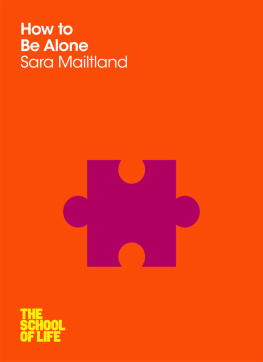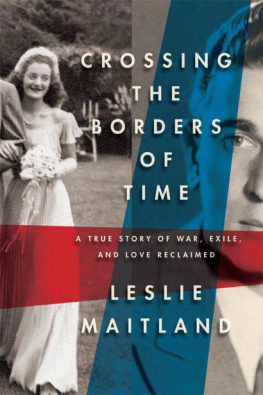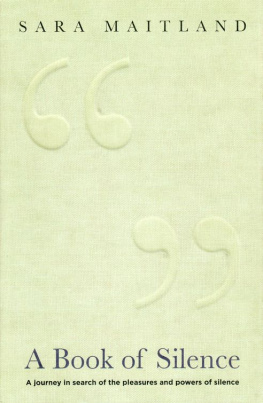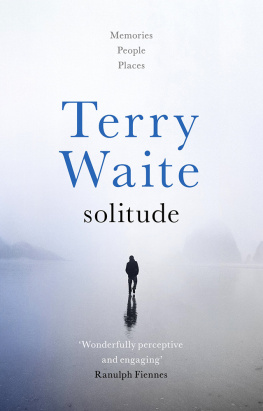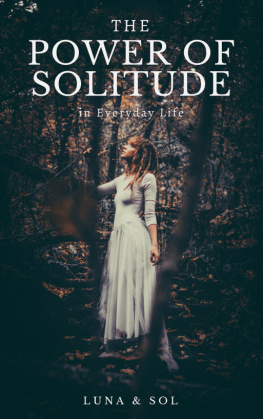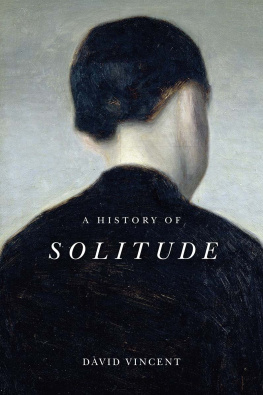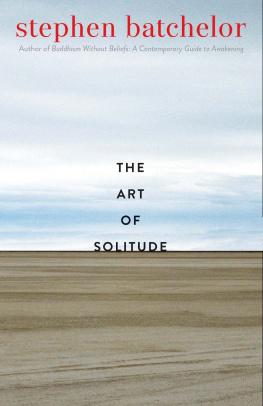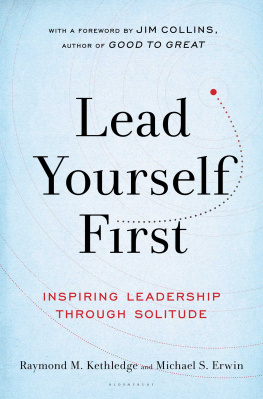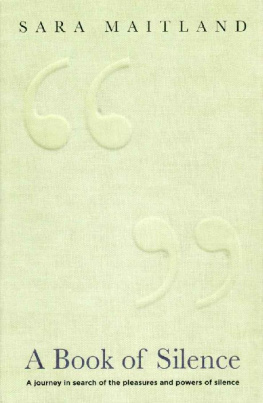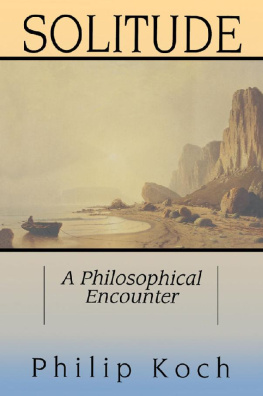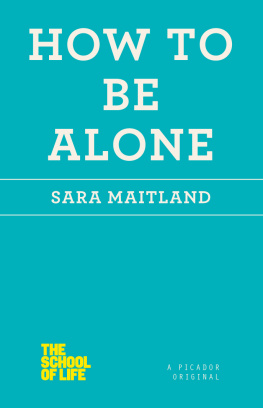
I. Introduction
You have just started to read a book that claims, at least, to tell you how to be alone.
Why?
It is extremely easy to be alone; you do not need a book. Here are some suggestions:
Go into the bathroom; lock the door, take a shower. You are alone.
Get in your car and drive somewhere (or walk, jog, bicycle, even swim).You are alone.
Wake yourself in the middle of the night (you are of course completely and absolutely alone while you are asleep, even if you share your bed with someone else, but you are almost certainly not conscious of it, so lets ignore that one for the moment); dont turn your lights on; just sit in the dark. You are alone.
Now push it a bit. Think about doing something that you normally do in company go to the cinema or a restaurant, take a walk in the country or even a holiday abroad by yourself. Plan it out; the logistics are not difficult. You know how to do these things. You would be alone.
So what is the problem? Why are you reading this book?
And of course I do not know the answer. Not in your case, at least. But I can imagine some possible motives:
For some reason, good or bad, of which bereavement is perhaps the bitterest, your normal circle of not-aloneness has been broken up; you have to tackle unexpected isolation, you doubt your resources and are courageously trying to explore possible options. You will be a member of a fast-growing group single-occupancy households in the UK have increased from 12 per cent of all households in 1961 to nearly 30 per cent in 2011.
Someone you thought you knew well has opted for more solitude they have gone off alone to do something that excludes you, temporarily or for a longer period; you cannot really feel jealous, because it excludes everyone else too; you are a little worried about them; you cannot comprehend why they would do anything so weird or how they will manage. You want to understand.
You want to get something done something that feels important to you. It is quite likely, in this case, that it is something creative. But you find it difficult to concentrate; constant interruptions, the demands of others, your own busy-ness and sociability, endless connections and contacts and conversations make it impossible to focus. You realize that you will not be able to pay proper attention unless you find some solitude, but you are not sure how this might work out for you.
You want to get something done something that feels important to you and of its very nature has to be done alone (single-handed sailing, solo mountaineering and becoming a hermit are three common examples, but there are others). The solitude is secondary to you, but necessary, so you are looking for a briefing. This group is quite small, I think; most of the people who seriously want to do these sorts of things tend to be experienced and comfortable with a degree of aloneness before they become committed to their project.
You have come to the disagreeable awareness that you do not much like the people you are spending time with; yet you sense that you are somehow addicted to them, that it will be impossible to change; that any relationship, however impoverished, unsatisfying, lacking in value and meaning, is better than no relationship; is better than being alone. But you arent sure. You are worried by the very negative responses you get whenever you bring the subject up.
You are experiencing a growing ecological passion and love of nature. You want to get out there, and increasingly you want to get out there on your own. You are not sure why this new love seems to be pulling you away from sociability and are looking for explanations.
You are one of those courageous people who want to dare to live; and to do so believe you have to explore the depths of yourself, undistracted and unprotected by social conventions and norms. You agree with Richard Byrd, the US admiral and explorer, who explained why he went to spend the winter alone on the southern polar ice cap in 1934: I wanted to go for experiences sake; one mans desire to know that kind of experience to the full... to be able to live exactly as I chose, obedient to no necessities but those imposed by wind and night and cold, and to no mans laws but my own. You do not, of course, need to go all the way to Antarctica to achieve this, but you do need to go all the way into yourself. You feel that if you have not lived with yourself alone, you have not fully lived. You want to get some clues about what you might encounter in this solitary space.
You feel and do not fully understand the feeling that you are missing something. You have an inchoate, inarticulate, groping feeling that there is something else, something more, something that may be scary but may also be beautiful. You know that other people, across the centuries and from a wide range of cultures and countries, have found this something and they have usually found it alone, in solitude. You want it. Whatever it is. You are reading this book not because you want to know how to be alone, which is perfectly easy as soon as you think about it, but because you want to know why you might want to be alone; why the whole subject fills you with both longing and deep unease. You want to know what is going on here.
But actually the most likely reason why you are reading this book (like most books) is curiosity why would someone write this book?
And I can answer that question, so that is where I am going to begin.
I live alone. I have lived alone for over twenty years now. I do not just mean that I am single I live in what might seem to many people to be isolation rather than simply solitude. My home is in a region of Scotland with one of the lowest population densities in Europe, and I live in one of the emptiest parts of it: the average population density of the UK is 674 people per square mile (246 per square kilometre). In my valley, though, we have (on average) over three square miles each. The nearest shop is ten miles away, and the nearest supermarket over twenty. There is no mobile-phone connection and very little through-traffic uses the single-track road that runs a quarter of a mile below my house. Often I do not see another person all day. I love it.
But I have not always lived alone. I grew up in a big family, one of six children, very close together in age, and in lots of ways a bit like a litter of puppies. It was not a household much given to reflection or introversion we were emotional, argumentative, warm, interactive. We did things together. I am still deeply and affectionately involved with all my siblings. I became a student in 1968 and was fully involved in all the excitement and hectic optimism of those years. Then I was married and had two children. I became a writer. I have friends friendship remains one of the core values of my life. None of this looked like a life of solitude, nor a good preparation for living up a back road on a huge, austere Scottish moor.
What changed was that I got fascinated by silence; by what happens to the human spirit, to identity and personality when the talking stops, when you press the off-button, when you venture out into that enormous emptiness. I was interested in silence as a lost cultural phenomenon, as a thing of beauty and as a space that had been explored and used over and over again by different individuals, for different reasons and with wildly differing results. I began to use my own life as a sort of laboratory to test some ideas and to find out what it felt like. Almost to my surprise, I found I loved silence. It suited me. I got greedy for more. In my hunt for more silence, I found this valley and built a house here, on the ruins of an old shepherds cottage. I moved into it in 2007.
Next page
